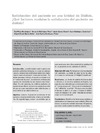Identificador persistente para citar o vincular este elemento:
https://accedacris.ulpgc.es/jspui/handle/10553/74311
| Campo DC | Valor | idioma |
|---|---|---|
| dc.contributor.author | Pérez Domínguez, Tais | en_US |
| dc.contributor.author | Rodríguez Pérez, Armando | en_US |
| dc.contributor.author | Suárez Álamo, Jesús | en_US |
| dc.contributor.author | Rodríguez Castellano, Leire | en_US |
| dc.contributor.author | García Bello, Miguel Ángel | en_US |
| dc.contributor.author | Rodríguez Pérez, José Carlos | en_US |
| dc.date.accessioned | 2020-09-09T10:31:20Z | - |
| dc.date.available | 2020-09-09T10:31:20Z | - |
| dc.date.issued | 2012 | en_US |
| dc.identifier.issn | 2254-2884 | en_US |
| dc.identifier.other | Scopus | - |
| dc.identifier.uri | https://accedacris.ulpgc.es/handle/10553/74311 | - |
| dc.description.abstract | Introducción: La enfermedad renal requiere una atención sanitaria prolongada, en la que se conjugan tanto la competencia profesional como otras habilidades tanto emocionales como psicosociales. En dichos procesos crónicos, el usuario se convierte en el "centro del sistema", necesitando profesionales capaces de atenderles de una manera multidisciplinar. En este contexto, las políticas sanitarias no pueden desarrollarse sin tener en cuenta la opinión del paciente que supondrá un valor añadido para la percepción de su salud o bienestar. Objetivo: Conocer el grado de satisfacción de los pacientes con enfermedad renal crónica en hemodiálisis. En segundo lugar, conocer las variables que se asocian al aumento o disminución de la satisfacción de los pacientes en las unidades de diálisis. Material y Método: Participaron en la investigación 187 pacientes. La media de edad fue de 66 años. Utilizamos el cuestionario SERVQHOS modificado. Resultados. Los niveles de satisfacción fueron altos y similares a los de otras unidades en España. Los aspectos peor valorados por nuestros pacientes eran el "tiempo de espera", "el servicio de ambulancias" y la "calidad de la comida". Factores como la edad, el tiempo en diálisis, el sexo y el turno de diálisis (turno de mañana o de tarde) modulan las puntuaciones en el cuestionario. Conclusiones: Identificar los factores que modulan la satisfacción es tan importante como evaluarla. Deben de tenerse en cuenta las variables inherentes del paciente, que están condicionando la satisfacción percibida. | en_US |
| dc.description.abstract | Introduction: Kidney disorders require prolonged medical treatment, in which professional competence is combined with other skills, both emotional and psychosocial. In these chronic processes, the user becomes the "centre of the system," needing professionals able to attend to them in a multidisciplinary way. In this context, health policy cannot work without taking into account the patient's opinion, which represents added value in terms of the perception of their health or well-being. Aim: To find out the degree of satisfaction among patients with chronic kidney disorders in haemodialysis. Secondly, to establish the variables associated with greater or lesser satisfaction on the part of patients in dialysis units. Material and Method: 187 patients took part in the research. Their average age was 66. We used a modified SERVQHOS questionnaire. Results: Satisfaction levels were high and similar to those in other units in Spain. The worst-rated aspects by these patients were "waiting time," "the ambulance service" and the "quality of the food." Factors such as age, time on dialysis, sex and dialysis shift (morning or afternoon shift) affect the ratings on the questionnaire. Conclusions: Identifying the factors affecting satisfaction is as important as assessing it. This must take into account the variables inherent to the patient which are influencing perceived satisfaction. | en_US |
| dc.language | spa | en_US |
| dc.relation.ispartof | Enfermeria Nefrologica | en_US |
| dc.source | Enfermeria Nefrologica [ISSN 2254-2884], v. 15 (2), p. 101-107, (Enero 2012) | en_US |
| dc.subject | 320506 Nefrología | en_US |
| dc.subject.other | Satisfacción del paciente | en_US |
| dc.subject.other | Hemodiálisis | en_US |
| dc.subject.other | Calidad percibida | en_US |
| dc.title | Satisfacción del paciente en una Unidad de Diálisis. ¿Qué factores modulan la satisfacción del paciente en diálisis? | en_US |
| dc.title.alternative | Patient satisfaction in a dialysis unit: What factors influence patient satisfaction in dialysis? | en_US |
| dc.type | info:eu-repo/semantics/Article | en_US |
| dc.type | Article | en_US |
| dc.identifier.scopus | 84875985127 | - |
| dc.contributor.authorscopusid | 55646447900 | - |
| dc.contributor.authorscopusid | 57212427136 | - |
| dc.contributor.authorscopusid | 55646400100 | - |
| dc.contributor.authorscopusid | 55646435500 | - |
| dc.contributor.authorscopusid | 35336118200 | - |
| dc.contributor.authorscopusid | 57212029797 | - |
| dc.identifier.eissn | 2255-3517 | - |
| dc.description.lastpage | 107 | en_US |
| dc.identifier.issue | 2 | - |
| dc.description.firstpage | 101 | en_US |
| dc.relation.volume | 15 | en_US |
| dc.investigacion | Ciencias de la Salud | en_US |
| dc.type2 | Artículo | en_US |
| dc.utils.revision | Sí | en_US |
| dc.date.coverdate | Enero 2012 | en_US |
| dc.identifier.ulpgc | Sí | es |
| item.grantfulltext | open | - |
| item.fulltext | Con texto completo | - |
| crisitem.author.dept | GIR IUIBS: Patología y Tecnología médica | - |
| crisitem.author.dept | IU de Investigaciones Biomédicas y Sanitarias | - |
| crisitem.author.orcid | 0000-0003-0023-1063 | - |
| crisitem.author.parentorg | IU de Investigaciones Biomédicas y Sanitarias | - |
| crisitem.author.fullName | Rodríguez Pérez,José Carlos | - |
| Colección: | Artículos | |
Citas SCOPUSTM
6
actualizado el 08-jun-2025
Visitas
47
actualizado el 10-ene-2026
Descargas
57
actualizado el 10-ene-2026
Google ScholarTM
Verifica
Comparte
Exporta metadatos
Los elementos en ULPGC accedaCRIS están protegidos por derechos de autor con todos los derechos reservados, a menos que se indique lo contrario.
